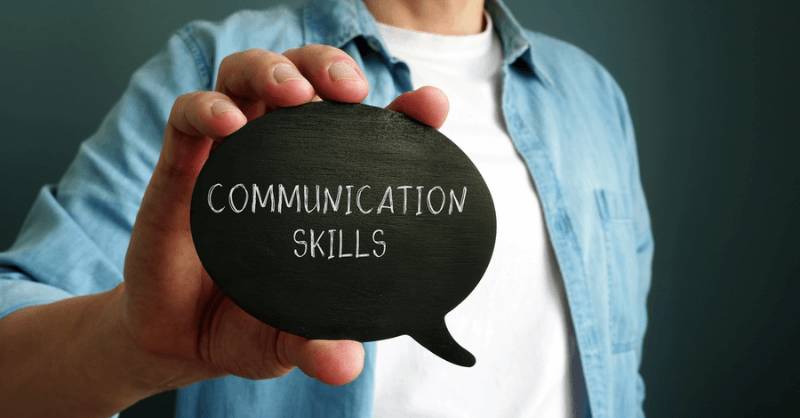Tips to Improve Your Communication Skills:;,,,,,;,,,,,
1. Develop Active Listening Skills
Communication is a two-way process, and listening is just as important as speaking. Active listening involves not only hearing the words being said but also understanding the message behind them. To improve active listening:
Maintain eye contact to show engagement.
Avoid interrupting while the other person is speaking.
Nod or offer brief verbal cues like “I see†or “Go on†to show you’re paying attention.
Summarize or paraphrase what the speaker has said to confirm your understanding.
2. Be Clear and Concise
Clarity is key to effective communication. When expressing your thoughts, focus on making your message simple and easy to understand:
Organize your thoughts before you speak or write.
Use straightforward language, avoiding unnecessary jargon unless the audience is familiar with it.
Get to the point quickly, especially in formal communication, to respect the listener's time.
If delivering complex information, break it down into smaller, digestible parts.
3. Understand Non-Verbal Communication
Your body language, facial expressions, tone of voice, and even how fast or slow you speak all communicate messages beyond words. To improve non-verbal communication:
Maintain open body posture to signal receptiveness.
Avoid crossing your arms or looking at the ground, which can make you appear disinterested or defensive.
Use gestures and facial expressions to reinforce your points but avoid overdoing them, as this can be distracting.
4. Adjust to Your Audience
Effective communication varies depending on the audience. Tailor your approach to suit the person or group you're speaking to:
For formal settings (e.g., professional meetings), keep a more structured and polished tone.
For casual or personal conversations, use a more relaxed tone, but still stay respectful.
Be mindful of the audience’s background, preferences, and interests, and adjust your language or examples accordingly.
5. Ask for Feedback
Improving your communication requires ongoing effort, and one of the best ways to enhance your skills is by asking for feedback:
After presentations or important conversations, ask trusted colleagues or friends how well you conveyed your message.
Pay attention to both verbal and non-verbal feedback from your audience during conversations. If they seem confused or disengaged, adjust your approach.
Use constructive criticism as an opportunity to learn and grow.
6. Work on Emotional Intelligence (EQ)
Emotionally intelligent people are not only aware of their own emotions but also empathetic towards others. This awareness helps them communicate more effectively in sensitive or challenging situations:
Practice empathy by putting yourself in the other person’s shoes to better understand their feelings and perspective.
Be mindful of your tone, as it can influence how your message is received, especially when discussing difficult topics.
Keep your emotions in check to avoid letting anger or frustration cloud your communication.
7. Practice Public Speaking
Whether it's a formal presentation or a casual speech at a family gathering, public speaking skills are essential for boosting confidence and clarity. To improve public speaking:
Practice regularly by speaking in front of small groups or even in front of a mirror.
Focus on your pacing—avoid speaking too quickly or too slowly.
Engage with your audience by asking questions or encouraging interaction.
8. Enhance Your Writing Skills
Written communication is equally important, especially in today's digital age, where emails, reports, and social media interactions are common. To improve your writing:
Proofread your messages for clarity, grammar, and spelling errors.
Be concise and direct, particularly in emails and professional correspondence.
Ensure that your tone is appropriate for the medium and audience. For example, an email to a supervisor will differ in tone from a message to a close friend.
9. Be Open to New Perspectives
Effective communicators are open to hearing different opinions and ideas. Being flexible and open-minded in conversations fosters trust and respect:
Avoid being defensive if someone disagrees with you. Instead, ask questions to understand their viewpoint.
Don’t assume you always know the right answer; be willing to learn from others.
Adapt to new information and adjust your stance when appropriate.
10. Prepare for Challenging Conversations
Difficult conversations are inevitable, whether it’s giving feedback, handling conflict, or delivering bad news. Preparing for such interactions can help you communicate more effectively:
Anticipate the emotions that may arise during the conversation and think of ways to stay calm and composed.
Focus on solutions and common goals rather than assigning blame.
Use “I†statements (e.g., “I feel…†or “I noticed…â€) to express your perspective without sounding accusatory.
Conclusion,,,;,,,,,,
Improving your communication skills requires practice, self-awareness, and a willingness to learn from both successes and mistakes. By developing active listening, understanding non-verbal cues, tailoring your message to your audience, and continuously seeking feedback, you’ll become a more effective communicator in both your personal and professional life. Effective communication not only builds better relationships but also opens doors to new opportunities.


